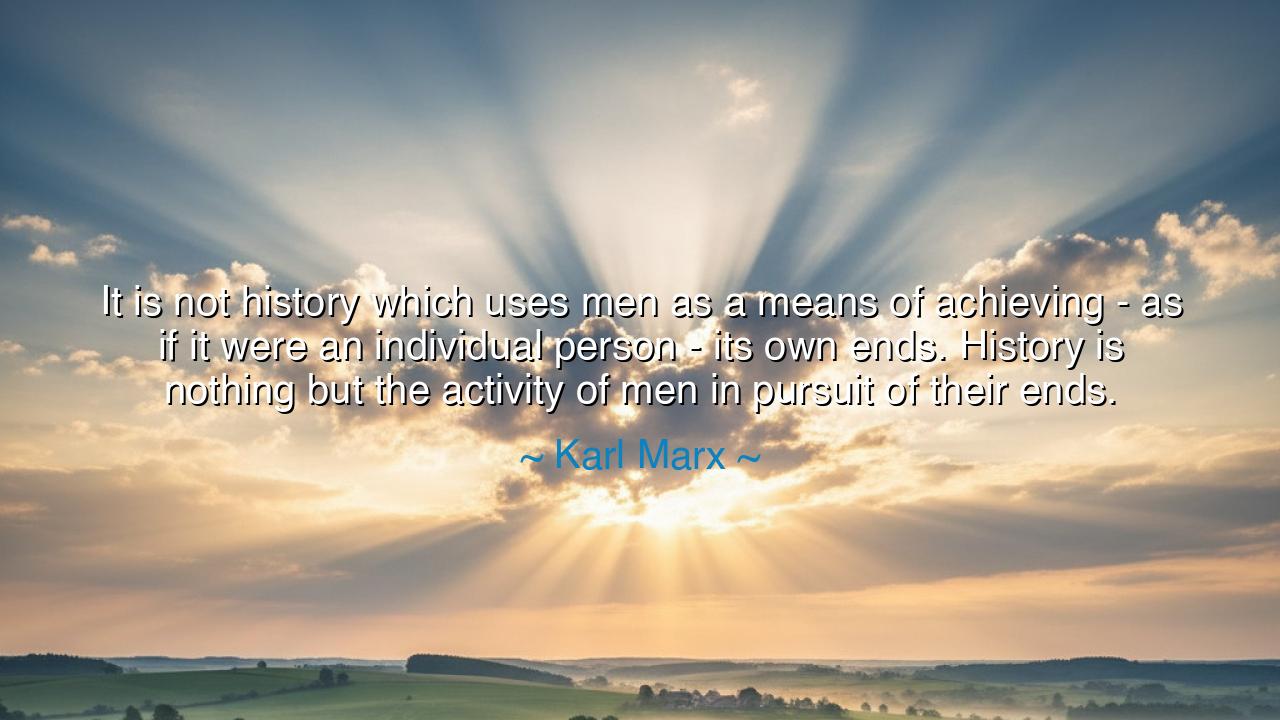
It is not history which uses men as a means of achieving - as if
It is not history which uses men as a means of achieving - as if it were an individual person - its own ends. History is nothing but the activity of men in pursuit of their ends.






“It is not history which uses men as a means of achieving—as if it were an individual person—its own ends. History is nothing but the activity of men in pursuit of their ends.” — Karl Marx
Thus spoke Karl Marx, the philosopher who peered into the furnace of human progress and saw not fate, but will; not destiny, but action. In this statement, Marx tears down the illusion that history is a being with a mind of its own — some divine or mechanical force that moves men like pawns toward an inevitable conclusion. No, he says, history is not an actor, but the stage upon which men act. It does not think or desire; it does not plan or decide. It is only the sum of the deeds, struggles, and dreams of humanity — of flesh and spirit, of the hands that build and the hearts that yearn.
The origin of this truth lies in Marx’s rejection of the fatalism that had taken hold of philosophy in his time. Many thinkers had come to speak of history as if it were a god — a silent force that carried nations forward, regardless of the people within them. But Marx, the student of toil and revolution, saw otherwise. He walked among the workers of the industrial age, the men and women whose labor built the wealth of empires, and he recognized that it was their sweat, not some unseen destiny, that shaped the future. Thus, he declared that history is made, not given. It is born from human choices, from conflict and cooperation, from the ceaseless pursuit of our own ends.
In his words, we hear the echo of every age where mankind has mistaken circumstance for fate. For it is easy, when the world seems vast and indifferent, to believe that we are mere passengers upon the current of time. Yet Marx reminds us that the current is not divine — it is human. Every event, every revolution, every transformation, has come because men and women dared to act. The great pyramids rose not because history demanded them, but because men obeyed kings and labored under the sun. The French Revolution did not erupt because “history required justice,” but because a people, starving and enraged, rose up to demand it. History does not use men — men use history.
Consider the example of Nelson Mandela, who, though born into a world shackled by racial tyranny, refused to let “history” dictate his people’s destiny. For centuries, the narrative of South Africa seemed fixed — the powerful would rule, and the oppressed would remain voiceless. But Mandela and his comrades understood Marx’s wisdom: that history is the activity of men in pursuit of their ends. Through endurance, sacrifice, and defiance, they reshaped the world’s expectation of what was possible. In their struggle, we see that history bends not to time itself, but to the courage of those who stand against it.
This truth carries both hope and burden. Hope, because it means that no chain of circumstance is unbreakable; burden, because it places responsibility upon every soul. If history is merely the product of human action, then every injustice that endures does so because men permit it. To say “history will judge” is an illusion — it is not history that judges, but the living, through their choices and their silence. We are not passengers of time, but its architects. The world of tomorrow will bear the imprint of what we choose to build today.
Marx’s words also strike at the heart of moral complacency. For many hide behind the excuse that “things are as they have always been.” Yet if history is the work of human hands, then nothing that exists is beyond change. Slavery, tyranny, inequality — these were not the decrees of some eternal order, but the creations of human will, and therefore, they can be undone by human will. In this, Marx’s teaching is a call to awakening — a reminder that to accept the world as it is, without striving to better it, is to abandon one’s power as a maker of history.
So, O children of time, remember this: you are not the servants of history, but its authors. Do not wait for the tides of fate to turn in your favor; take the oar and steer. Each act of justice, each word of truth, each labor of love contributes to the eternal manuscript of humankind. The future does not arrive — it is built, carved by the hands of those who dare to act. Let your pursuits, therefore, be noble; let your ends be guided by wisdom and compassion. For though the names of men may fade, the consequences of their deeds endure forever.
As Karl Marx reminds us, history is not an unseen power that shapes mankind — it is mankind that shapes history. Every revolution begins with a decision, every new world with a dream. And when the years have passed and your life becomes a chapter in the story of this earth, let it be said that you did not drift upon the current, but that you helped turn the tide.






AAdministratorAdministrator
Welcome, honored guests. Please leave a comment, we will respond soon